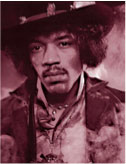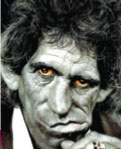Rock and roll has been unfairly blamed for a  plethora of social ills since the first white guy discovered he could make a fortune playing “race music.” Promiscuous teenagers? Blame that Elvis guy and his turbo-charged hips. Rebellion against authority? Never had
plethora of social ills since the first white guy discovered he could make a fortune playing “race music.” Promiscuous teenagers? Blame that Elvis guy and his turbo-charged hips. Rebellion against authority? Never had
that until “Cop Killer.” Gingivitis? Ban the 1910 Fruitgum Company!
Unfortunately, one point of contention is harder to defend than Allen Iverson. This would be the connection between rock music and drugs. In response to the burgeoning “Rock Against Drugs” campaign in the late 80s, Sam Kinison joked that rock invented drugs. This may not be true, but there is no denying a connection (hopefully one that delivers) exists.
We’re all well aware of the drug-fueled tragedies that dot the musical landscape, from musical giants such as Jimi Hendrix and Janis Joplin to lesser-known casualties like Andrew Wood and Shannon Hoon. It’s apparent that drugs are the second leading cause of premature rocker death, trailing only small private aircraft. Yet it seems that there will always be a fresh crop of chemically enhanced wannabes ready to step into their predecessors’ shoes, even if only for long enough to jump in their graves.
Rather than pass judgment on these fallen idols or their myriad apostles, it seemed that no one has ever thanked drugs for inspiring some great music through the years. Let’s face facts—many of the greatest musicians in rock history have been narcotically influenced. Yet these same musicians are excoriated for their vices. I’d like to break with convention and offer a hearty “thank you” to our often misunderstood friends—drugs.
In the overall scheme of things, it appears that rock music has greatly benefited from the infusion of mind-altering substances. Through the years, drugs have helped rock musicians push the plastic Zip-Loc envelope of what can be done in a previously limited artistic
medium. What would music sound like if Jimi Hendrix had not transformed the blues into something louder and scarier? What if Kurt Cobain hadn’t shot up superhuman amounts of heroin to quell the pain of his “burning, nauseous stomach?” And how much poorer would rock’s oeuvre be if Keith Richard and his well-documented demons never picked up a guitar?
Quitting drugs has led to great things as well. Pete Townshend wrote Tommy while recovering from heroin addiction. Aerosmith went from the “Where are they now?” file to being one of the hottest bands of the late 80s and early 90s after going through rehab collectively. Still, both arguably developed their best work under the influence. Sure—Eric Clapton flourished after becoming sober. He also got really, really boring. Clapton went from the freewheeling, distorted experimentation of Cream to being just another radio-friendly pussy.
I’m not claiming that you need to have used drugs at some point to make great music. Quite the contrary. Anyone who has ever seen a bunch of wasted musicians engaged in a misguided exercise in musical masturbation will agree, unless of course they actually like Phish. In other words, it’s cool to expand your mind to otherwise unseen possibilities—just sober up before foisting your “brilliant” ideas on everyone else. Otherwise, you’re no different than that unbearable, shit-faced douchebag that’s surgically attached to your buddy’s couch as the party is winding down who natters on endlessly about how all of the planet’s problems could be solved if you could just eradicate the world’s supply of paper. “Naaaah, wait man...just hear me out, bro...” God, I hate that fucking guy!
Believe it or not, many prominent rockers through the years are stridently anti-drug. Gene Simmons, Chrissie Hynde, Ted Nugent, and Frank Zappa (!) all just said no. Still, they seem to be in the minority. The fact is that we like our rockers wasted and crazy. Jim Morrison? Wasted and crazy. Axl Rose? Him, too. Courtney Love? Completely fried and potentially homicidal.
Whenever one of our heroes dies, there’s always some Mother Hen
lurking in the wings with a sound bite imploring people to use this tragedy as a life lesson to abstain from drug use. There’s no denying that drugs have claimed scores of victims. I’ve personally lost close friends to heroin and cocaine. Others I simply misplaced while I was stoned. But I don’t blame drugs. I blame poor judgment. Like anything else, moderation is the key. Even water can kill you if you drink too much of it.
Unfortunately, once someone reaches a certain point, there’s not a lot anyone else can do short of imprisonment to stop an addict from destroying himself. Even imprisonment doesn’t work. You mean to tell me Layne Staley couldn’t have taken some of the mechanical royalties he amassed from “Man in the Box” and checked into Betty Ford? I’m sure someone in his life at some point expressed concern for his well-being, even if only to get him back in the studio to churn out more product. The sad truth is that various psychological factors most of us hope to never experience conspired to silence one of the most distinctive rock voices ever. Perhaps drugs exacerbated the situation, but odds are he had other issues gnawing at his soul.
Put simply, drugs can be good for art and bad for the artist. I’m not trying to glorify substances that have transformed personal friends of mine into corpses—or even worse, hippies. Yet it’s hard to deny that without drugs rock music would be far less interesting and possibly nonexistent at this point in time. Perhaps it’s time to acknowledge that with all of the lip service paid to the evils of drug use, there actually have been some great works produced under the influence. In a country that values pop culture possibly above all else, we should offer thanks to the source of fuel that keeps the creative engines, and the rest of us humming.
So thank you, drugs. Rock couldn’t have done it without you. If you’re not too busy, maybe we can hang out this weekend? I’m working on this song....
Rich Evans is the singer for 1234 and the author of the soon-to-be-released book Why I Didn’t Kill Bon Jovi.





